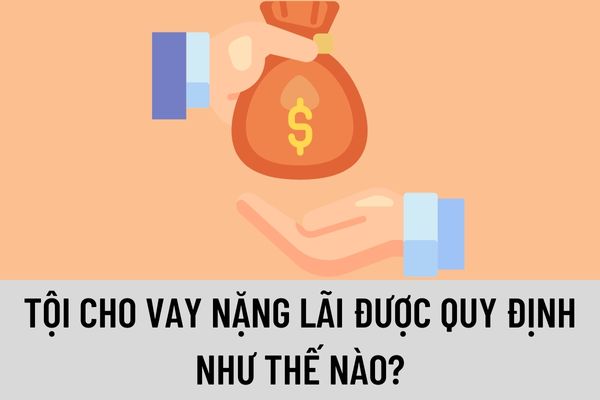Vietnam: What are the regulations on usury? How to determine the number of illicit profits from usury?
What interest rates will be attributed to usury in Vietnam?
Pursuant to Clause 1, Article 468 of the 2015 Civil Code of Vietnam provides as follows:
Article 478. Interest rates
1. The rate of interest for a loan shall be as agreed by the parties.
The rate of interest for a loan agreed by the parties may not exceed 20% per year, unless otherwise prescribed by law. According to actual conditions and at the proposal of the Government, the Standing Committee of National Assembly shall adjust the above interest and send report to the National Assembly at the latest session.
If the agreed interest exceeds the maximum interest prescribed in this Clause, the agreed interest shall become invalid.
Pursuant to Clause 1, Article 201 of the 2015 Criminal Code of Vietnam (amended and supplemented by Point i, Clause 2, Article 2 of the 2017 Criminal Code Amendment Law of Vietnam) provides as follows:
Article 201. Exercise of the people ownership rights with respect to property allocated to regulatory agencies and units of armed forces
1. Where property in the category of the people-owned property is allocated to a regulatory agency or unit of the armed forces, the State shall exercise the right to inspect the management and use of such property.
2. The regulatory agency or unit of the armed forces shall manage and use the property allocated by the State for the correct purpose in accordance with law.
Thus, according to the above provisions, the interest rate when lending is agreed upon by the two parties but must not exceed 20% / year of the loan amount. In case the agreed interest rate exceeds the limit interest rate specified in this Clause, the excess interest rate shall not take effect.
Accordingly, usury is an act in civil transactions that lend at an interest rate 05 times the interest rate of 20% / year of the loan and make illegal profits of VND 30 million or more.

Vietnam: What are the regulations on usury? How to determine the number of illicit profits from usury?
How to determine the number of illicit profits from usury in Vietnam?
Pursuant to Article 6 of Resolution 01/2021/NQ-HDTP stipulates as follows:
Determining the amount of ill-gotten gains to handle criminal liability
1. In case the heavy interest loan has expired as agreed upon, the amount of illicit profits to determine criminal liability includes interest and other illegal revenues that the borrower must pay to the lender after deducting the amount of interest corresponding to the highest interest rate as prescribed by the Civil Code of Vietnam in the whole loan maturity.
2. In case a heavy interest loan has not expired the loan term under the agreement but is detected, the amount of illicit profits to determine criminal liability includes interest and other illegal revenues that the borrower must pay to the lender after deducting the amount of interest corresponding to the highest interest rate as prescribed by the Code. Civil as of the moment the competent authority detects and prevents.
In case the borrower has paid early interest and other illegal revenues, the amount of illicit profits to determine criminal liability includes interest and other illegal revenues that the borrower has actually paid to the lender after deducting the amount of interest corresponding to the highest interest rate as prescribed by the Civil Code of Vietnam.
Accordingly, the amount of ill-gotten gains to determine criminal liability includes interest and other unlawful revenues that the borrower must pay to the lender after deducting the amount of interest corresponding to the interest rate of 20% per annum of the loan.
In case the heavy interest loan has not expired the loan term under the agreement but is detected, the amount of illicit profits to determine criminal liability includes interest and other illegal revenues that the borrower must pay to the lender after deducting the amount of interest corresponding to the interest rate of 20% / year of the loan amount up to the time. point the competent authority detects and prevents.
Can a loan shark who has not made an unjust profit due to unintended causes be held criminally liable for usury in Vietnam?
Pursuant to Clause 5, Article 7 of Resolution 01/2021/NQ-HDTP stipulates as follows:
Criminal prosecution in some specific cases
.....
5. In case the lender has made heavy interest in order to make an unjust profit of VND 30,000,000 or more, but for unintended reasons, the lender has not made an unjust profit or has made an unjust profit of less than VND 30,000,000, he/she shall be examined for criminal liability according to the penalty frame corresponding to the total amount of illicit profits they aim to achieve. The determination of the amount of illicit profits shall be carried out in accordance with the instructions in Article 6 of this Resolution. When deciding on punishment, the Court applies Article 15 and Clause 3, Article 57 of the Penal Code for unsatisfactory offenses.
Accordingly, usury lenders who have not made unjust profits due to unintended causes are still subject to criminal prosecution under the penalty frame corresponding to the total amount of illicit profits they aim to achieve.
When deciding on punishment, the Court applies the provision on unsatisfactory offenses.
LawNet
